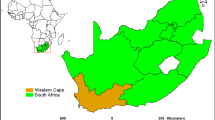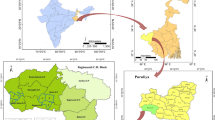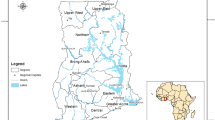Abstract
This paper makes an attempt to identify and analyse the factors that influence the household use of wetlands in West Bengal, India. Three wetlands were selected from three physiographically distinct regions of West Bengal, which are used by local people for multiple purposes. Logit and Tobit models are used for the identification of the factors explaining household dependency on wetland. The results indicate that there is spatial difference in the mode and extent of use of wetland resources across the three wetlands. Households belonging to poor, landless, lower social caste, and low education level are more likely to use wetland resources compared to their counterparts. Households having larger family size are likely to extract bigger amounts of wetland products. However, upper caste households have more access to the wetlands for irrigation. The results indicate that wetland plays a vital role for the livelihood of marginalized sections of the community. Therefore, it is needed to device appropriate policy for equitable distribution of the benefits of the wetlands among different sections of the society.



Similar content being viewed by others
References
Abdulai A, Regmi PP (2000) Estimating labor supply of farm households under nonseparability: empirical evidence from Nepal. Agr Econ 22(3):309–320
Adhikari B (2005) Poverty, property rights and collective action: understanding the distributive aspects of common property resource management. Environ Dev Econ 10(1):7–31
Agarwal B (2009) Gender and forest conservation: the impact of women’s participation in community forest governance. Ecol Econ 68(11):2785–2799
Ambastha K, Hussain SA, Badola R (2007) Resource dependence and attitudes of local people toward conservation of Kabartal wetland: a case study from the Indo-Gangetic plains. Wetl Ecol Manag 15(4):287–302
Barbier EB, Acreman M, Knowler D (1997) Economic valuation of wetlands: a guide for policy makers and planners. Ramsar Convention Bureau, Gland
Blumenfeld S, Lu C, Christophersen T, Coates D (2009) Water, Wetlands and Forests. A review of ecological, economic and policy linkages. Secretariat of the convention on biological diversity and secretariat of the ramsar convention on Wetlands, Montreal and Gland. CBD Technical Series No. 47
Campbell BM (2002) Household livelihoods in semi-arid regions: options and constraints. CIFOR, Nairobi
Chakraborty SK (2010) Coastal Environment of Midnapore, West Bengal: potential Threats and Management. J Coast Environ 1(1):27–40
Chattopadhyay K (2001) Environmental conservation and valuation of East Calcutta Wetlands. Wetlands and Biodiversity EERC Working Paper Series: WB-2
Chen L, Heerink N, Van den Berg M (2006) Energy consumption in rural China: a household model for three villages in Jiangxi Province. Ecol Econ 58(1):407–420
Das S, Nandi AK (2007) Ecology by decentralized economy: case study of a CPR. Proceeding of the national seminar ecorestoration of soil and water resources towards efficient crop production held at AT FTC (Lake Hall), Kalyani on June 6–7, 2007
Das TK, Moitra B, Raichaudhuri A, Jash T, Ghosh S, Mukherjee A (2000) Degradation of water bodies and Wetlands in West Bengal: interaction with economic development, final report, funded by environmental economics research committee, world bank aided India: environmental management capacity building Programme. http://coe.mse.ac.in/eercrep/fullrep/wetbio/WB_FR_TKDas.pdf. Accessed 31 July 2011
Fafchamps M, Quisumbing AR (1999) Human capital, productivity, and labor allocation in rural Pakistan. J Hum Resour 34:369–406
Fisher M (2004) Household welfare and forest dependence in Southern Malawi. Environ Dev Econ 9(2):135–154
Foote AL, Pandey S, Krogman NT (1996) Processes of wetland loss in India. Environ Conserv 23(1):45–54
Frenken K, Mharapara I (2002) Wetland development and management in SADC countries. Paper presented at the proceedings of a sub-regional workshop held in Harare, Zimbabwe, 19–23 Nov 2001
Hussain SA, Badola R (2010) Valuing mangrove benefits: contribution of mangrove forests to local livelihoods in Bhitarkanika Conservation Area, East Coast of India. Wetl Ecol Manag 18(3):321–331
Institute of Environmental Studies and Wetland Management (1999) Special studies on wetlands of West Bengal for the development, conservation and maintenance of the habitats of waterfowls and associated bio-diverse elements, funded by the department of forest, government of West Bengal
Jodha NS (1986) Common property resources and rural poor in dry regions of India. Econ Polit Wkly 21(27):1169–1181
Jogo W (2010) Managing the trade-off between conservation and exploitation of wetland services for economic well-being: the case of the Limpopo wetland in southern Africa. PhD thesis. University of Pretoria, RSA. http://start.org/files/2010/09/Jogo_PhD_thesis_final2.pdf, Accessed 18 Mar 2011
Jogo W, Hassan R (2010) Determinants of rural household labour allocation for wetland and other livelihood activities: the case of the Limpopo wetland in Southern Africa. Agrekon 49(2):195–216
Jolliffe D (2004) The impact of education in rural Ghana: examining household labor allocation and returns on and off the farm. J Dev Econ 73(1):287–314
Kipkemboi J, Van Dam AA, Ikiara MM, Denny P (2007) Integration of smallholder wetland aquaculture-agriculture systems (fingerponds) into riparian farming systems on the shores of Lake Victoria, Kenya: socio-economics and livelihoods. Geogr J 173(3):257–272
Matiza T, Chabwela HN (1992) Wetlands management: a critical issue for conservation in Africa. Paper presented at the wetlands conservation conference in Southern Africa, IUCN, Mavuti
Matshe I, Young T (2004) Off-farm labour allocation decisions in small-scale rural households in Zimbabwe. Agr Econ 30(3):175–186
Millennium Ecosystem Assessment (2005) Ecosystems and human well-being: wetland and water synthesis. Washington, D. C. World Resources Institute http://www.unep.org/maweb/documents/document.358.aspx.pdf. Accessed 01 Jan 2014
Mitsch W, Gosselink JG (2002) Wetlands, 4th edn. Wile, New York, pp 259–261
Mmopelwa G (2006) Economic and financial analysis of harvesting and utilization of river reed in the Okavango Delta Botswana. J Environ Manag 79(4):329–335
Mukherjee S (2008) Economic valuation of a wetland in West Bengal, India. http://works.bepress.com/cgi/viewcontent.cgi?article=1020&context=sacchidananda_mukherjee. Accessed 31 Dec 2014
Mwakubo SM, Obare GA (2009) Vulnerability, livelihood assets and institutional dynamics in the management of wetlands in Lake Victoria watershed basin. Wetl Ecol Manag 17(6):613–626
Narain U, Gupta S, van’t Veld K (2008) Poverty and resource dependence in rural India. Ecol Econ 66(1):161–176
Ramsar Convention Secretariat (2013) The ramsar convention manual: a guide to the convention on wetlands (Ramsar, Iran, 1971), 6th edn. Ramsar Convention Secretariat, Gland, pp 55–56
Sen S (2007) Management guidelines for wise use of freshwater wetlands: a community based approach for selected wetlands of West Bengal. PhD thesis, Indian Institute of Technology-Kharagpur
Space Application Centre (SAC), Indian Space Research Organisation (2010) National Wetland Atlas. India & West Bengal
TARU (2010) Environmental and social safeguards, and planning in panchayati raj institutions: capacity assessment and management plans. Volume-I: environmental and social safeguards and management framework. http://wbprd.nic.in/html/asp/writereaddata/Social_ManagementFramework_for_GPs.pdf. Accessed 05 Aug 2011
Taylor RD, Howard GW, Begg GW (1995) Developing wetland inventories in Southern Africa: a review. Vegetatio 118:57–79
Turner RK, Georgiou S, Fisher B (2008) Valuation of ecosystem services: thecase of multifunctional-wetlands. Earthscan Publications, London
Turpie J, Smith B, Emerton L, Barnes J (1999) Economic value of the zambezi basin wetlands. IUCN regional office for Southern Africa. Zambezi basin wetlands conservation and resource utilization project
Acknowledgments
We thank two anonymous reviewers for their constructive comments which have helped improve the quality of paper immensely. We are thankful to several persons for their help in this research. Some of the notable persons are Dr. Dhrubojyoti Ghosh, Special Advisor, IUCN; Dr. Subir K. Ghosh, Thematic Group Lead, Ecosystem Management Group (Capacity Building), IUCN; Dr. S. C. Santra, Professor, Department of Environmental Sciences, University of Kalyani; Dr. A. K. Nandi, Associate Professor and Head, Department of Agricultural Economics, Bidhan Chandra Krishi Viswavidyalaya; and scientists at the Institute of Environmental Studies and Wetland Management (IESWM), Kolkata for their valuable suggestions. We are thankful to several friends and colleagues, especially Dr. Tamoghna Acharya and Mr. Partho Protim Mondal for providing valuable inputs in the draft of the paper. We are also indebted to the Department of Fisheries, Government of West Bengal and Mr. Raja Chatterjee, Secretary, The jungles and all the villagers for providing data during our fieldwork. We also want to say thanks to the field assistants for helping us in data collection.
Author information
Authors and Affiliations
Corresponding author
Rights and permissions
About this article
Cite this article
Das, S., Behera, B. & Mishra, A. Determinants of household use of wetland resources in West Bengal, India. Wetlands Ecol Manage 23, 803–816 (2015). https://doi.org/10.1007/s11273-015-9420-8
Received:
Accepted:
Published:
Issue Date:
DOI: https://doi.org/10.1007/s11273-015-9420-8




